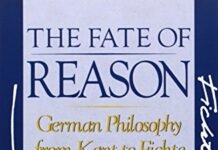
Ebook Info
- Published: 2014
- Number of pages: 624 pages
- Format: PDF
- File Size: 26.04 MB
- Authors: Frederick C. Beiser
Description
Frederick C. Beiser tells the story of the emergence of neo-Kantianism from the late 1790s until the 1880s. He focuses on neo-Kantianism before official or familiar neo-Kantianism, i.e., before the formation of the various schools of neo-Kantianism in the 1880s and 1890s (which included the Marburg school, the Southwestern school, and the Göttingen school). Beiser argues that the source of neo-Kantianism lies in three crucial but neglectedfigures: Jakob Friedrich Fries,
User’s Reviews
Reviews from Amazon users which were colected at the time this book was published on the website:
⭐This is a solid intellectual history with a focus — as the author states explicitly — on the intellectual biographies, as opposed to on the impact of political or institutional context. Why read this book? In line with other recent books on the topic, the author presents the Neo-Kantians as under-appreciated and misunderstood. There’s a bit of a revival of interesting in the Neo-Kantians going on, of which this volume is a part. The effort is to rescue the Neo-Kantians from the reputation that they had as “academic” — read dry, boring, apolitical — philosophers. The argument here, as I understand it, is that they weren’t, as once presumed, ensconced and stable intellectuals safe within the “ivory tower”; that in fact they struggled at times against a dominant class of philosophers in German, who espoused a form of philosophy known as “speculative idealism” associated with Hegel. The Neo-Kantians were ultimately triumphant against the speculative idealists, but it wasn’t a pre-ordained victory. Moreover, although this book doesn’t tread to far into the domain of politics, there are suggestions (I’m not fully done with the book) that the author views the Neo-Kantians as an important source of political liberalism in Germany — a liberalism that was important though it failed to hold its own against the forces of Fascism in the early twentieth century. Because the author does not want to do a political analysis, it may be that he ultimately does not deal directly with the question of why Neo-Kantian though failed to be a enduring source for liberal politics in Germany, But as I said, I’m not finished with the book.
⭐Good overview of major Neo-Kantian thinkers by a scholar who seems to have read all the primary texts and who makes a real effort to enable the nonspecialist the follow the inner dynamics of their debates.
⭐AStonishingly wide ranging of the post Kantian thinking. Well written making a huge subject approachable. Recommended without hesitation.
Keywords
Free Download The Genesis of Neo-Kantianism, 1796-1880 1st Edition in PDF format
The Genesis of Neo-Kantianism, 1796-1880 1st Edition PDF Free Download
Download The Genesis of Neo-Kantianism, 1796-1880 1st Edition 2014 PDF Free
The Genesis of Neo-Kantianism, 1796-1880 1st Edition 2014 PDF Free Download
Download The Genesis of Neo-Kantianism, 1796-1880 1st Edition PDF
Free Download Ebook The Genesis of Neo-Kantianism, 1796-1880 1st Edition





